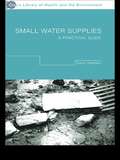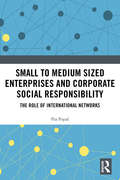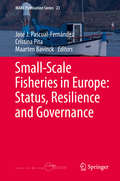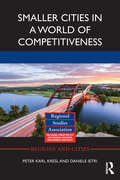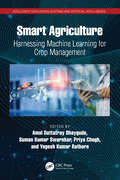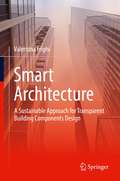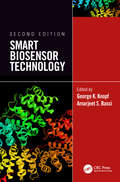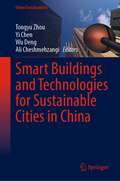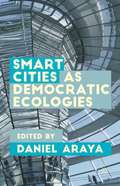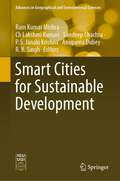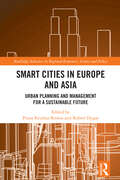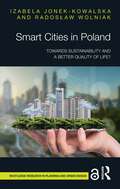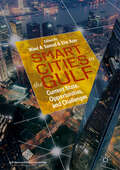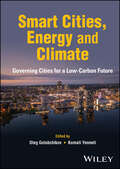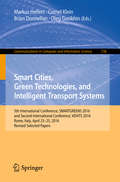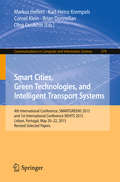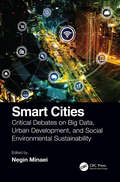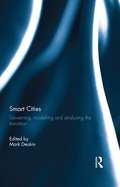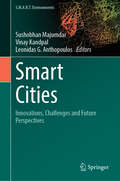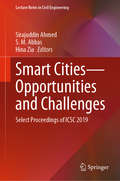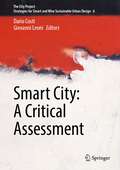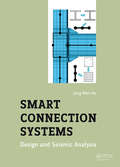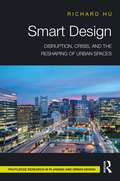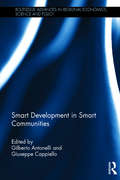- Table View
- List View
Small Water Supplies: A Practical Guide
by David ClaphamThere are approximately 50,000 small water supplies in the UK alone, and thousands more worldwide. Dealing with the idiosyncratic characteristics of small water supplies requires specialist knowledge, and this book provides invaluable guidance for professionals.Based on the extensive practical experience of the author, this book covers how small independent supplies differ from public water supplies, and outlines the health dangers they pose, along with detailed instruction in water sampling and risk assessment techniques. Clapham describes the different types of water supplies including their construction and treatment systems, and discusses common problems encountered. A wide range of case studies bring the theory to life, and both UK and European legislation is discussed. There is also a sizeable section dealing with small water supplies in developing countries.
Small to Medium Sized Enterprises and Corporate Social Responsibility: The Role of International Networks
by Pia PopalWhile the Corporate Social Responsibility (CSR) activities of small firms have been analysed to some extent, their engagement in international networks relating to CSR is less understood. Most of these networks primarily address the needs of multinational corporations. Surprisingly, however, the number of small firms participating in such institutions has substantially increased over recent years. But what is the reason for this new interest of SMEs in institutional forms of CSR? Based on a qualitative empirical study of German small firms’ participation in the most prominent CSR institution, the UN Global Compact, this book explores the drivers for small firms’ participation. The motivations are complex and do not follow the same hierarchical order associated with large business behaviour. Rather, reasons for institutional engagement suggest a heterarchical structure, where alignment is contingent upon factors such as the individual CSR perception, self-conception or social environment. The book explains why small firms prefer to engage in sustainable development within institutionalized forms of CSR rather than act in isolation, and provides recommendations on how to support and thus increase SME participation in institutionalized forms of civic engagement.
Small-Scale Fisheries in Europe: Status, Resilience and Governance (MARE Publication Series #23)
by Maarten Bavinck José J. Pascual-Fernández Cristina PitaThis book offers a comprehensive account of the status and dynamics of people participating in the small-scale fisheries (SSF) of Europe. It covers the situation of SSF in 25 coastal countries, thereby providing a portrait of almost every coastal country on the continent and analyzing the recent evolution of the sector. Small-scale fisheries are argued to be extremely important in Europe, as they provide employment and welfare, while increasing food sovereignty and maintaining communities in coastal areas. The recent worldwide focus on SSF derives from their environmental sustainability, which distinguishes many of their activities from those of large-scale fisheries. This book analyses the diversity of SSF and shows how fishing communities have sometimes developed successful governing models, demonstrating social and economic resilience. While the book emphasizes the strengths of SSF and the synergies that occur with other marine sectors, it also presents cases of failure, in which collective action and policy have actually contributed to a weakening of the sector. In this context, the book shows how governmental policies toward SSF vary considerably from country to country, in a way that is not entirely consistent with European policies.
Smaller Cities in a World of Competitiveness (Regions and Cities)
by Peter Karl Kresl Daniele IetriMuch recent research in Urban Studies has concentrated on the notion of the ‘global city’ but discussion has also covered a larger set of mega cities, with populations in excess of 10 million. This analysis has begged the question of the optimal size for a city – is larger always better? Smaller Cities explores the advantages and disadvantages of different sized cities, trying to determine their place in the global economy and hierarchy. How can smaller cities gain or retain their competitiveness in a world of large cities? In a globalized world, the nation has perhaps been diminished as an economic actor, with fiscal shortcomings and political gridlock leaving cities more or less on their own in the task of enhancing their competitiveness and improving the economic lives of their residents. This book argues that smaller cities of varying population can be important actors in competitiveness and aims to bring attention to an area often overlooked by researchers. In short, are Pittsburgh, San Diego and Austin less competitive than London and Mumbai? This volume will be of interest to students, researchers, and city professionals who work in urban economy and urban geography.
Smart Agriculture: Harnessing Machine Learning for Crop Management (Intelligent Data-Driven Systems and Artificial Intelligence)
by Suman Kumar Swarnkar Yogesh Kumar Rathore Amol Dattatray Dhaygude Priya ChughThis book, Smart Agriculture: Harnessing Machine Learning for Crop Management, is a comprehensive guide designed to explore the various facets of integrating machine learning into agricultural practices. It aims to provide readers with a solid foundation in machine learning concepts while demonstrating their practical applications in real-world farming scenarios. It also examines the role of remote monitoring and precision agriculture, highlighting how technologies such as remote sensing and recurrent neural networks can optimize farming practices.This book:· Emphasizes sustainable agricultural practices and data-driven decision-making for eco-friendly farming. · Highlights the importance of using environmentally friendly practices, and how machine learning can play a pivotal role in achieving sustainability goals. · Discusses topics such as crop optimization, disease detection, pest control, resource management, precision agriculture, and sustainability. · Covers predictive analytics for weather forecasting, Internet of Things applications for precision agriculture, and the role of sensors in data collection. · Illustrates optimizing resource allocation, irrigation with artificial intelligence, and machine learning for soil health assessment. Whether you are a researcher, a student, an agricultural professional, or a technology enthusiast, this book offers valuable insights into the transformative power of machine learning in agriculture. It invites readers to explore the potential of machine learning to transform farming practices, improve food security, and promote environmental sustainability.
Smart Architecture – A Sustainable Approach for Transparent Building Components Design
by Valentina FrighiThis book explores the specific role that glazing technologies play within the world of smart architecture as important components of contemporary and future sustainable architectural and technological research. Smart Architecture begins with a definition of the concept of “smart” in architecture and examines how innovative technologies and materials have shaped buildings over the years. The author then provides a supporting database of contemporary smart architecture—mapping adopted strategies, recognizing common patterns, and evaluating current and future trends in the context of smart building envelopes, energy efficiency, and the development of high-potential innovative building components. The book proceeds with a focus on the specific role that glazing technologies play in this framework and provides a systematic methodology to quantify options for the effective integration of transparent building components within advanced and innovative building envelope systems.
Smart Biosensor Technology
by George K. Knopf Amarjeet S. BassiBased on the success of the first edition, this second edition continues to build upon fundamental principles of biosensor design and incorporates recent advances in intelligent materials and novel fabrication techniques for a broad range of real world applications. The book provides a multi-disciplinary focus to capture the ever-expanding field of biosensors. Smart Biosensor Technology, Second Edition includes contributions from leading specialists in a wide variety of fields with a common focus on smart biosensor design. With 21 chapters organized in five parts, this compendium covers the fundamentals of smart biosensor technology, important issues related to material design and selection, principles of biosensor design and fabrication, advances in bioelectronics, and a look at specific applications related to pathogen detection, toxicity monitoring, microfluidics and healthcare. Features Provides a solid background in the underlying principles of biosensor design and breakthrough technologies for creating more intelligent biosensors Focusses on material design and selection including cutting-edge developments in carbon nanotubes, polymer nanowires, and porous silicon Examines machine learning and introduces concepts such as DNA-based molecular computing for smart biosensor function Explores the principles of bioelectronics and nerve cell microelectrode arrays for creating novel transducers and physiological biosensors Devotes several chapters to biosensors developed to detect and monitor a variety of toxins and pathogens Offers expert opinions on the future directions, challenges and opportunities in the field
Smart Buildings and Technologies for Sustainable Cities in China (Urban Sustainability)
by Ali Cheshmehzangi Wu Deng Yi Chen Tongyu ZhouThis book brings together the insights from professional associations who involved in developing relevant national standards in China, domestic and international scholars who are dedicated to research in related fields, and industry practitioners who have the most hands-on experience. Synthesizing their perspectives, this book discusses the advanced technologies that can meet the requirements for energy efficiency, building performance monitoring and management, and user-centric building services, which are considered the essential components for achieving sustainable and smart cities. Moreover, it provides reflections on the implementation of smart technologies and strategies in practice.
Smart Cities as Democratic Ecologies
by Daniel ArayaThe concept of the 'smart city' as the confluence of urban planning and technological innovation has become a predominant feature of public policy discourse. Despite its expanding influence, however, there is little consensus on the precise meaning of a 'smart city'. One reason for this ambiguity is that the term means different things to different disciplines. For some, the concept of the 'smart city' refers to advances in sustainability and green technologies. For others, it refers to the deployment of information and communication technologies as next generation infrastructure.
Smart Cities for Sustainable Development (Advances in Geographical and Environmental Sciences)
by Ram Kumar Mishra R. B. Singh Anupama Dubey Ch Lakshmi Kumari Sandeep Chachra P. S. Janaki KrishnaThis book reviews the structure, applications, technologies, governance, environmental sustainability, smart communities, gender space and other issues related to smart cities. The book is divided into four parts. The first one entails the conceptual background, growth and development. The second part presents diverse issues on smart cities in terms of environmental sustainability, the role of the community, and gender space, among others. The third part revolves around economic and technological issues, and the fourth is a compilation of case studies in connection with smart cities. This collection of diverse issues from different locations presents a holistic view of smart cities contributed by authors who have undertaken research projects and implemented their own unique perspectives and methods. A variety of innovative concepts such as digital governance, polycentric structures, geodata repositories, geoweb services and advanced geospatial technologies in smart city planning, urban microclimatic parameters, and urban heat islands provide invaluable knowledge for researchers and practitioners in these fields.
Smart Cities in Europe and Asia: Urban Planning and Management for a Sustainable Future (Routledge Advances in Regional Economics, Science and Policy)
by Prana Krishna Biswas Robert DygasThe smart city concept, together with the growing importance of the UN’s Sustainable Development Goals, has a significant impact on city management and governance. This book examines real cases of smart city management across Asia and Europe. It covers regions such as Iceland, Estonia, Poland, Germany, India, Indonesia, Malaysia, Singapore, and Vietnam to systemize the knowledge in the field. It evaluates smart cities’ efficiency and analyzes and assesses the standards, norms and best practices involved in the management of smart cities. The book answers questions such as what it is that makes smart cities stand out, why some countries in Europe and Asia have more smart cities than others, whether smart cities support the economy and GDP growth of the country, and what the main determinants of forming smart cities in Asia and Europe are. It also evaluates whether smart cities secure higher standards of living for their citizens as compared to regular cities. Many theoretical concepts and theories are developed and then verified from the perspective of Western economies. Central Eastern European and Asian countries are frequently overlooked, thus, examining the smart city idea from the viewpoint of non-Western economies offers a fresh insight into the concept and its adaptation and evolution. The range of issues analyzed in the book are multilayered and approached from a wide array of perspectives, from macroeconomics to management, finance and technology, and public policy. Thus, the book is addressed to researchers, students, and academics who specialize in sustainable and regional development, economic geography, and management. It will also be of interest to urban planners, environmental scientists, and policymakers.
Smart Cities in Poland: Towards sustainability and a better quality of life?
by Izabela Jonek-Kowalska Radosław WolniakThis book considers and examines the concept of a Smart City in the context of improving the quality of life and sustainable development in Central and Eastern European cities. The Smart City concept has been gaining popularity in recent years, with supporters considering it to be an effective tool to improve the quality of life of the city’s residents. In turn, opponents argue that it is a source of imbalance and claim that it escalates the problems of social and economic exclusion. This book, therefore, assesses the quality of life and its unsustainability in Central and Eastern European cities within the context of the Smart City concept and from the perspective of key areas of sustainable development. Using case studies of selected cities in Central and Eastern Europe and representative surveysof Polish cities, this book illustrates the process of creating smart cities and their impact on improving the quality of life of citizens. Specifically, this book investigates the conditions that a Smart City has to meet to become sustainable, how the Smart City concept can support the improvement of the residents’ quality of life and how Central and Eastern European countries create smartcity solutions. Containing both theoretical and practical content, this book will be of relevance to researchers and students interested in smart cities and urban planning, as well as city authorities and city stakeholders who are planning to implement the Smart City concept.
Smart Cities in Poland: Towards sustainability and a better quality of life? (Routledge Research in Planning and Urban Design)
by Izabela Jonek-Kowalska Radosław WolniakThis book considers and examines the concept of a Smart City in the context of improving the quality of life and sustainable development in Central and Eastern European cities.The Smart City concept has been gaining popularity in recent years, with supporters considering it to be an effective tool to improve the quality of life of the city’s residents. In turn, opponents argue that it is a source of imbalance and claim that it escalates the problems of social and economic exclusion. This book, therefore, assesses the quality of life and its unsustainability in Central and Eastern European cities within the context of the Smart City concept and from the perspective of key areas of sustainable development. Using case studies of selected cities in Central and Eastern Europe and representative surveysof Polish cities, this book illustrates the process of creating smart cities and their impact on improving the quality of life of citizens. Specifically, this book investigates the conditions that a Smart City has to meet to become sustainable, how the Smart City concept can support the improvement of the residents’ quality of life and how Central and Eastern European countries create smartcity solutions.Containing both theoretical and practical content, this book will be of relevance to researchers and students interested in smart cities and urban planning, as well as city authorities and city stakeholders who are planning to implement the Smart City concept.Chapter 2 and 6 of this book are freely available as a downloadable Open Access PDF at http://www.taylorfrancis.com under a Creative Commons Attribution-Non Commercial-No Derivatives (CC-BY-NC-ND) 4.0 license.
Smart Cities in the Gulf: Current State, Opportunities, And Challenges
by Wael A. Samad Elie AzarIn this edited volume, academics and practitioners from various disciplines investigate the challenges, opportunities and frameworks in the implementation of Smart Cities in the Gulf.The volume presents insightful analyses and identifies key lessons learned through case studies covering four main themes including smart city frameworks and governance, resources and infrastructure, information and communication technologies, and the social perspective. In doing so, the book provides policy recommendations related to smart governance, as well as overall frameworks that cities can adopt in their process of transition, and knowledge that is integral to bridge the gap between various stakeholders in the Smart City milieu. This edited volume comprises extended versions of papers presented at a workshop held at the University of Cambridge, UK titled “Smart Cities in the GCC: Current State, Opportunities and Challenges.”
Smart Cities, Energy and Climate: Governing Cities for a Low-Carbon Future
by Oleg Golubchikov Komali YennetiCollective insight of key thought leaders in the field to clarify and reshape the vision of smart cities Smart Cities, Energy and Climate: Governing Cities for a Low-Carbon Future is a seminal work that draws together insights and case studies on post-carbon urbanism across a variety of fields—from smart energy grids to active buildings, sustainable mobility and urban design. Another objective is to foster an understanding of how digitally-enhanced smart city solutions can assist energy transitions, and what new developments and challenges they bring in areas ranging from urban governance to energy security. Key topics covered in this book include: Recent developments in urban planning, building design and smart technologiesUrban-scale digital platforms and innovation for clean energy systems, energy efficiency and net-zero policiesSocio-technical and political relationships in climate-neutral cities and smart citiesContext-rich, situated perspectives from Europe, Africa and Asia Smart Cities, Energy and Climate serves as a primary reference for scholars, students and policy makers interested in the conceptual, technical, economic and political challenges associated with the transition towards a smart and sustainable urban future.
Smart Cities, Green Technologies, and Intelligent Transport Systems
by Markus Helfert Brian Donnellan Cornel Klein Oleg GusikhinThis book constitutes the thoroughly refereedproceedings of the 4th International Conference on Smart Cities and Green ICTSystems, SMARTGREENS 2015, and the 1st InternationalConference on Vehicle Technology and Intelligent Transport Systems, VEHITS2015, held in Lisbon, Portugal, in May 2015. The 15 full papers of SMARTGREENS 2015 presentedwere carefully reviewed and selected from 73 submissions. VEHITS 2015 received27 paper submissions from which 3 papers were selected and published in thisbook. The papers reflect topics such as smart cities, energy-aware systems andtechnologies, sustainable computing and communications, sustainabletransportation and smart mobility.
Smart Cities, Green Technologies, and Intelligent Transport Systems: 4th International Conference, Smartgreens 2015, And 1st International Conference Vehits 2015, Lisbon, Portugal, May 20-22, 2015, Revised Selected Papers (Communications In Computer And Information Science #579)
by Markus Helfert Karl-Heinz Krempels Brian Donnellan Cornel Klein Oleg GusikhinThis book constitutes the thoroughly refereedproceedings of the 4th International Conference on Smart Cities and Green ICTSystems, SMARTGREENS 2015, and the 1st InternationalConference on Vehicle Technology and Intelligent Transport Systems, VEHITS2015, held in Lisbon, Portugal, in May 2015. The 15 full papers of SMARTGREENS 2015 presentedwere carefully reviewed and selected from 73 submissions. VEHITS 2015 received27 paper submissions from which 3 papers were selected and published in thisbook. The papers reflect topics such as smart cities, energy-aware systems andtechnologies, sustainable computing and communications, sustainabletransportation and smart mobility.
Smart Cities: Critical Debates on Big Data, Urban Development and Social Environmental Sustainability
by Negin MinaeiIn the age of global climate change, society will require cities that are environmentally self-sufficient, able to withstand various environmental problems and recover quickly. It is interesting to note that many "smart" solutions for cities are leading to an unsustainable future, including further electrification, an increased dependence on the Internet, Internet of Things, Big Data, and Artificial Intelligence, and basically any technology that leads us to consume more electricity. This book examines critical topics in Smart Cities such as true sustainability and the resilience required for all cities. It explores sustainability issues in agriculture and the role of agri-technology for a sustainable future, including a city’s ability to locally produce food for its residents. Features: Discusses safety, security, data management, and privacy issues in Smart Cities Examines the various emerging forms of transportation infrastructure and new vehicle technology Considers how energy efficiency can be achieved through behavioral change through specific building operations Smart Cities: Critical Debates on Big Data, Urban Development and Social Environmental Sustainability brings awareness to professionals working in the fields of environmental, civil, and transportation engineering, urban planners, and political leaders about different environmental aspects of Smart Cities and refocuses attention on critical urban infrastructure that will be necessary to respond to future challenges including climate change, food insecurity, natural hazards, energy production, and resilience.
Smart Cities: Governing, Modelling and Analysing the Transition
by Mark DeakinSmart city development has emerged a major issue over the past 5 years. Since the launch of IBM’s Smart Planet and CISCO’s Smart Cities and Communities programmes, their potential to deliver on global sustainable development targets have captured the public’s attention. However, despite this growing interest in the development of smart cities, little has as yet been published that either sets out the state-of-the-art, or which offers a less than subjective, arm’s length and dispassionate account of their potential contribution. This book brings together cutting edge research and the findings from technical development projects from leading authorities within the field to capture the transition to smart cities. It explores what is understood about smart cities, playing particular attention on the governance, modelling and analysis of the transition that smart cities seek to represent. In paving the way for such a representation, the book begins to account for the social capital of smart communities and begins the task of modelling their embedded intelligence through an analysis of what the "embedded intelligence of smart cities" contributes to the sustainability of urban development. This innovative book offers an interdisciplinary perspective and shall be of interest to researchers, policy analysts and technical experts involved in and responsible for the planning, development and design of smart cities. It will also be of particular value to final year undergraduate and postgraduate students interested in Geography, Architecture and Planning.
Smart Cities: Innovations, Challenges and Future Perspectives (S.M.A.R.T. Environments)
by Leonidas G. Anthopoulos Sushobhan Majumdar Vinay KandpalThis book aims to integrate new technologies and adaptation tools into the process of smart city planning. It also emphasizes the value and importance of modern technologies such as IoT and data science as a smart technology for the formation of a smart city. The authors believe that various technologies in a smart city will reduce all the problems for the sustainable growth and future prospects of the city. The first section of this book discusses the innovation of new technologies (AI, data science, block chain, etc.) that has flourished in recent decades which will make the city smarter. This section also describes that block chain and IoT (Internet of Things) are two transformative technologies that can greatly impact smart cities by enhancing security, improving transparency, and enabling efficient management of resources. The second section of the book explains about the uses of AI tools and smart technologies (like waste management, public safety and security) for the development and management of smart cities. This chapter also describes AI-powered systems that are integrated into smart buildings to optimize energy usage, enhance occupant comfort, and improve building management. These systems can adjust lighting and HVAC settings based on occupancy, learn user preferences, and provide personalized energy efficiency recommendations. The third portion of the book investigates the recent challenges and barriers of smart city that have been faced by the smart cities in the recent decades. This section also describes various challenges and barriers for the implementation of IoT sensor, AI technologies, etc., for the formation of a smart city. The future prospects of a smart city are the main theme of the last chapter. In this section, an attempt has been made about the future vision and outlook of the smart city. This chapter also describes different approaches (like smart grid, societal smart city, smart city model, etc.) for the future planning and management of the city.
Smart Cities—Opportunities and Challenges: Select Proceedings of ICSC 2019 (Lecture Notes in Civil Engineering #58)
by Sirajuddin Ahmed S. M. Abbas Hina ZiaThis book comprises select proceedings of the International Conference on Smart Cities: Opportunities and Challenges (ICSC 2019). The book contains chapters based on urban planning and design, policies and financial management, environment, energy, transportation, smart materials, sustainable development, information technologies, data management and urban sociology reflecting the major themes of the conference. The contents focus on current research towards improved governance and efficient management of infrastructure such as water, energy, transportation and housing for sustainable development, economic growth, and improved quality of life, especially for developing nations. This book will be useful for academicians, researchers, and policy makers interested in designing, developing, planning, managing, and maintaining smart cities.
Smart City: A Critical Assessment (The City Project #6)
by Giovanni Leoni Dario CostiThis contributed volume reports on a multidisciplinary collective work on the topic of Smart City, merging scientific reflections and operational issues. Here, current Smart Cities concepts are subjected to criticism, while the related terminology has been updated to contemplate a model of urban development capable of integrating technical and humanistic culture by fostering an open dialogue between different stakeholders. Upon an introduction to the state of the art, this book presents a glossary of definitions and concepts around the contemporary city, and five interviews with researchers and scholars of different background. The last chapter summarizes current challenges in designing the city of the future, highlighting new research directions in home-infrastructure, small smart city, energy transition, connectivity, digitalization and autonomous and connected mobility.Written by the members of the Scientific Committee of the Smart City 4.0 Sustainable LAB ResearchLaboratory, an inter-university network including research groups from the University of Parma, University of Modena and Reggio Emilia, University of Bologna, University of Ferrara, the Polytechnic University of Milan, and the Catholic University of Milan with its Piacenza campus, this book offers a source of inspiration for other researchers and stakeholders, and it is intended to foster collaborations between different stakeholders - and possibly countries – to develop future cities that are wise, green, sustainable and inclusive.
Smart Connection Systems: Design and Seismic Analysis
by Jong Wan HuThis book introduces new smart connection systems which can be used in aseismic building design in order to control inter-story drifts and to reduce residual displacements. They are also utilized as damper devices and base isolators. The application of these systems to composite moment frame buildings will also be treated in the book. In addition,
Smart Design: Disruption, Crisis, and the Reshaping of Urban Spaces
by Richard HuThis book tackles the emerging smart urbanism to advance a new way of urban thinking and to explore a new design approach. It unravels several urban transformations in dualities: economic relationality and centrality, technological flattening and polarisation, and spatial division and fusion. These dualities are interdependent; concurrent, coexisting, and contradictory, they are jointly disrupting and reshaping many aspects of contemporary cities and spaces. The book draws on a suite of international studies, experiences, and observations, including case studies in Beijing, Singapore, and Boston, to reveal how these processes are impacting urban design, development, and policy approaches. The COVID-19 pandemic has accelerated many changes already in motion, and provides an extreme circumstance for reflecting on and imagining urban spaces. These analyses, thoughts, and visions inform an urban imaginary of smart design that incorporates change, flexibility, collaboration, and experimentation, which together forge a paradigm of urban thinking. This paradigm builds upon the modernist and postmodernist urban design traditions and extends them in new directions, responding to and anticipating a changing urban environment. The book proposes a smart design manifesto to stimulate thought, trigger debate, and, hopefully, influence a new generation of urban thinkers and smart designers. It will be of interest to scholars, students, and practitioners in the fields of urban design, planning, architecture, urban development, and urban studies.
Smart Development in Smart Communities (Routledge Advances in Regional Economics, Science and Policy)
by Gilberto Antonelli Giuseppe CappielloThe concept of smart cities has become one of the most significant new lines of thinking to emerge in the social sciences in recent years, both from the research and policy angles. To date, the focus in smart specialization has been on what regions as a whole can do to bring about innovation, but it hasn’t necessarily addressed the role cities play within the field. This book aims to address that gap, drawing together a team of leading contributors, to illustrate this process with particular focus on cities.Smart Development in Smart Communities discusses the cross-fertilization between smart specialization and cities in fostering smart development and its interactions with the macro-, micro- and meso-economic framework, from both a theoretical and applied perspective. Specific topics covered by the book include: human capital formation and utilization; centralized/decentralized industrial policies; innovation policies; collective learning; and the role of public utilities in sustaining smart development processes. This book tackles some of the most important questions that must be faced when investigating how structural change and innovation processes are shaping local and global economic development. It will be of interest to academics and researchers in the area of Development Economics, Urban Studies and Public Management.
